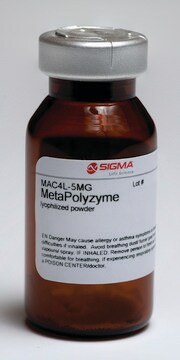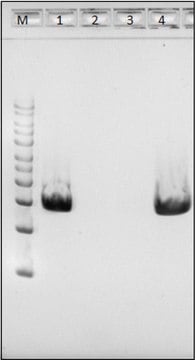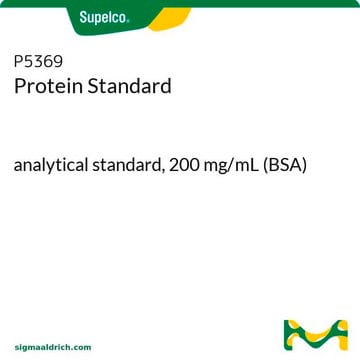SAE0200
MycoPolyzyme
for use with yeast and fungal lysis, free of DNA contaminants, suitable for Microbiome research
Autenticatiper visualizzare i prezzi riservati alla tua organizzazione & contrattuali
About This Item
Codice UNSPSC:
12352204
NACRES:
NA.77
Prodotti consigliati
Livello qualitativo
Forma fisica
lyophilized powder
Caratteristiche
DNA free
Condizioni di spedizione
wet ice
Temperatura di conservazione
−20°C
Descrizione generale
Lytic Enzyme Mixture is a mix of two enzymes: lyticase and chitinase, which have been proven useful in fungal and yeast lysis for microbiome studies. Lyticase is preferred to digest cell walls of yeast and generate spheroplasts from fungi for transformation. Chitinases have been detected in many microorganisms and in plants. In fungi, chitinases assist in morphogenesis, to break down the inherent chitin content of fungal cell walls. Plant chitinases help in resistance to fungal attack and counteracting fungal growth, by targeting those same fungal cell walls. In bacteria, bacterial chitinases assist in utilizing chitin as a carbon source and as an energy source. The mixture of the two enzymes has also been tested to ensure absence of microbial DNA.
Applicazioni
The study of microbial communities has been revolutionized in recent years by the widespread adoption of culture independent analytical techniques such as 16S rRNA gene sequencing and metagenomics. Since DNA contamination during sample preparation is a major problem of these sequence-based approaches, DNA extraction reagents free of DNA contaminants are essential. Lytic Enzyme Mixture undergoes strict quality control testing to ensure the absence of detectable levels of contaminating microbial DNA using 35 cycles PCR amplification of 16S and 18S rDNA using universal primer sets.
Componenti
The enzymes in Lytic Enzyme Mixture are:
The enzymes are tested for absence of contaminating microbial DNA using 16S and 18S PCR amplification.
- Lyticase
- Chitinase
The enzymes are tested for absence of contaminating microbial DNA using 16S and 18S PCR amplification.
Avvertenze
Danger
Indicazioni di pericolo
Consigli di prudenza
Classi di pericolo
Resp. Sens. 1
Codice della classe di stoccaggio
11 - Combustible Solids
Classe di pericolosità dell'acqua (WGK)
WGK 3
Certificati d'analisi (COA)
Cerca il Certificati d'analisi (COA) digitando il numero di lotto/batch corrispondente. I numeri di lotto o di batch sono stampati sull'etichetta dei prodotti dopo la parola ‘Lotto’ o ‘Batch’.
Possiedi già questo prodotto?
I documenti relativi ai prodotti acquistati recentemente sono disponibili nell’Archivio dei documenti.
Articoli
Enzymatic cell lysis and protoplast prep processes demystified, revealing complex enzymatic reactions during sample preparation.
Il team dei nostri ricercatori vanta grande esperienza in tutte le aree della ricerca quali Life Science, scienza dei materiali, sintesi chimica, cromatografia, discipline analitiche, ecc..
Contatta l'Assistenza Tecnica.








